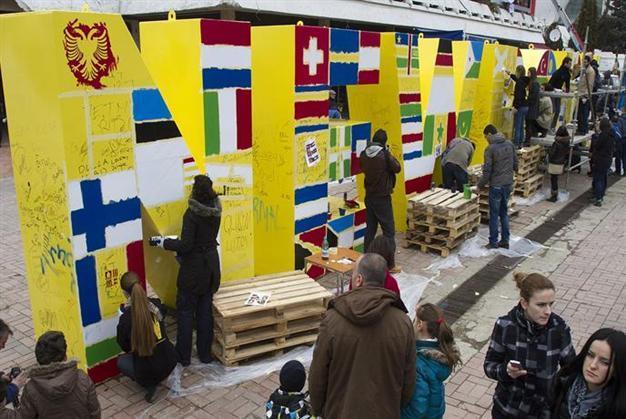Kosovo marks 'irrefutable' independence
PRISTINA - Agence France-Presse

Kosovo Albanian volunteers gather to paint the flags of the countries that have recognized Kosovo's independence on to the "NEWBORN" monument marking the secession of Kosovo from Serbia in capital Pristina on Saturday, Feb. 16, 2013. AP Photo / Visar Kryeziu
Kosovo's president insisted that its independence was an "irrefutable reality" as the impoverished territory on Sunday marked five years since it broke away from Serbia.
Relations have thawed with longtime foe Serbia under EU-sponsored reconciliation talks which are key to Belgrade's bid to join the bloc, but tensions remain and daily life in Kosovo is still a struggle for many.
"The republic of Kosovo is an irrefutable reality and its independence is irreversible," president Atifete Jahjaga said in a televised address.
Kosovo's star-studded flags fluttered along the main streets of Pristina alongside the US Stars and Stripes ahead of a military parade by the Kosovo Security Force (KSF), trained by NATO as an emergency force.
Almost 100 countries -- including the United States -- have recognised Kosovo since ethnic Albanians proclaimed independence on February 17, 2008, almost a decade after the 1998-1999 conflict that ended with a NATO bombing campaign against late Serbian strongman Slobodan Milosevic's forces.
Belgrade still considers the region its southern province, but the EU-led talks which began in March 2011 have led to a recent thaw in relations, and the two presidents held their first talks in Brussels on February 6.
With Serbia's EU membership dependent on improving ties with Pristina, Prime Minister Ivica Dacic hinted last month Belgrade may give up its opposition to Kosovo's long-held goal of joining the United Nations.
But Dacic has said the "most difficult part of this dialogue is ahead of us" in order to reach agreement with Pristina on the integration of the Serb minority.
Kosovo Prime Minister Ivica Thaci said Saturday that Pristina hoped the EU-sponsored talks -- which were upgraded to top-level negotiations in October -- would lead to the "independence of Kosovo being recognised soon" by Serbia.
Stumbling blocks remain, including Belgrade's hope for some autonomy for the 120,000 Serbs who refuse to recognise the ethnic Albanian authorities.
Kosovo foreign minister Enver Hoxhaj said he hoped the next round of talks starting on Tuesday in Brussels would open the door to elections that would help integrate ethnic Serbs and would eventually end parallel institutions in minority areas in the north of Kosovo, such as ethnic Serb police.
"Once they are removed, we will be able in the following months to organise democratic elections at the local level and integrate these communities into the rest of Kosovo," Hoxhaj told German radio on Saturday.
Serbian media have widely ignored the anniversary, focusing instead on the topics to be discussed in Brussels, with the populist daily Vecernje Novosti insisting: "Only Serbian laws can save the Serbs in Kosovo." The political progress has been overshadowed by the daily struggles of Kosovans, who say the euphoria of independence has worn off as they deal with the practical realities of living in disputed territory in one of Europe's poorest regions.
More than a third of Kosovo's 1.8 million people live on less than a dollar a day and gross domestic product per capita is one of the lowest in Europe at 2,600 euros ($3,500) a year, according to the World Bank.
"Young people have almost no chance to even find work," said 25-year old economics student Arsim Musliu.
Pristina has struggled to tackle organised crime and corruption and unemployment stands at 40 percent.
"In five years of independence, Kosovo's successes have been extremely low," lamented Kosovo daily Zeri.
"The past five years have not brought any progress or positive developments that would give a meaning to this day," added 30-year-old-economist Isuf Olluri."
